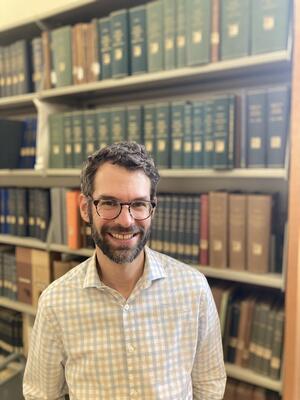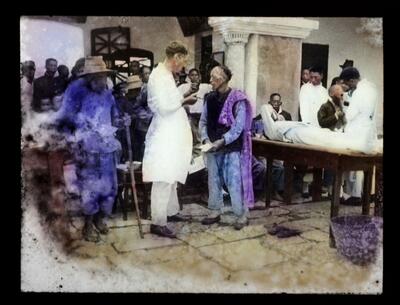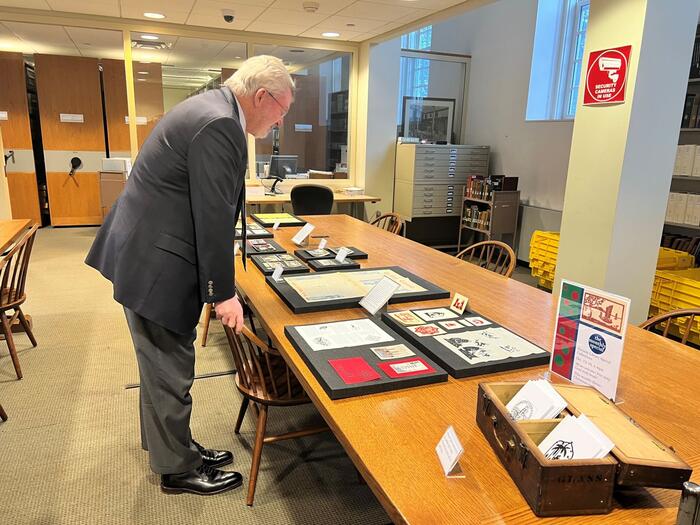Scott Libson ’06 M.A.R. is the new Special Collections Librarian for the Divinity Library. In an interview for YDS news, Libson reviews the path that brought him back to his divinity alma mater, why librarianship is a promising career path for divinity students, and what’s so “special” about the Special Collections.
What brought you back to YDS?
 As an undergraduate at Columbia, I wanted to find a student job related to my major (archaeology), so I applied to work in a rare book and manuscript library. I continued that sort of work while I was at YDS, so by the time I finished my M.A.R. in 2006, I already had five years of experience working in libraries and was able to get a professional job in the Columbia University Libraries. I stayed there for four years before starting a Ph.D. in history, again working in a library during that time. So, even though I did not have a library science degree, I had a lot of experience working in libraries by the time I finished my doctorate and was able to land a pretty amazing job as the history librarian at Indiana University Bloomington.
As an undergraduate at Columbia, I wanted to find a student job related to my major (archaeology), so I applied to work in a rare book and manuscript library. I continued that sort of work while I was at YDS, so by the time I finished my M.A.R. in 2006, I already had five years of experience working in libraries and was able to get a professional job in the Columbia University Libraries. I stayed there for four years before starting a Ph.D. in history, again working in a library during that time. So, even though I did not have a library science degree, I had a lot of experience working in libraries by the time I finished my doctorate and was able to land a pretty amazing job as the history librarian at Indiana University Bloomington.
I love to do historical research and to help others do research, so librarianship was a pretty logical career choice. I got really lucky when the Special Collections Librarian position at the Divinity Library opened up, since my academic research and writing is in precisely the types of collections we are most well-known for, missionary records. Throughout my entire time in academia and libraries, I have had mentors and advocates who have taught me and guided me and who have been willing to overlook an embarrassing comment I have made here or there and have continued to be supportive even when I email out-of-the-blue after a decade. So how I got here is partly luck, partly hard work, partly societal privileges (having a Yale degree has certainly helped), and partly hanging on to the coattails of those who came before me.
What’s new at Special Collections and what makes the collections so “special”?
We have renewed emphasis on getting our collections out there. We want people to stop by and see what we offer! Special Collections is open to everyone, and if you’re interested in anything related to human history, we probably have something for you. What makes us “special” is that our material is old, rare, valuable, and/or fragile, so we take certain precautions like asking visitors to leave bags, pens, and water bottles in lockers outside the room. Also, if the material has been digitized, we may refer people to the online version instead of showing the original. None of that should stop anyone from visiting, though. Just like we are all now used to passing through TSA before our flights, you will quickly get used to the restrictions. You will be welcomed by one of our student assistants or by our professional staff, Joan Duffy and Abigail Kromminga ‘22 M.A.R. Joan (“Joan of Archives”) is a Senior Archives Assistant and has a wealth of knowledge about the collections. Abigail is an Archives Assistant and was such an extraordinary student employee that we asked her to move into a full-time role after graduating. We are extremely fortunate she agreed to do so!
 For many years, we have been known for our records on missionaries and world Christianity. After George Edward Day started building his missions library in the late 19th century, it quickly became one of the best in the world, and that led to more and more missionary collections coming to the library, especially after the National Council of Churches decided to make YDS the repository for the China Records Project. To be known as one of the preeminent repositories for missions and world Christianity is really important to maintain, but we are also so much more than that. For one, those records about missionaries are not just about the history of missions. They also document the evolution of medicine in many parts of the world, of education (particularly for girls), of theological history, of printing and language, of agriculture, of financial systems, of major events, of American knowledge of and interest in the rest of the world, of communication and transportation networks, and of foreign perceptions of Americans. They are really the records of Americans’ (and, to a lesser extent, people from other nations) interactions with the world during a period when that was far less common than it is today.
For many years, we have been known for our records on missionaries and world Christianity. After George Edward Day started building his missions library in the late 19th century, it quickly became one of the best in the world, and that led to more and more missionary collections coming to the library, especially after the National Council of Churches decided to make YDS the repository for the China Records Project. To be known as one of the preeminent repositories for missions and world Christianity is really important to maintain, but we are also so much more than that. For one, those records about missionaries are not just about the history of missions. They also document the evolution of medicine in many parts of the world, of education (particularly for girls), of theological history, of printing and language, of agriculture, of financial systems, of major events, of American knowledge of and interest in the rest of the world, of communication and transportation networks, and of foreign perceptions of Americans. They are really the records of Americans’ (and, to a lesser extent, people from other nations) interactions with the world during a period when that was far less common than it is today.
In addition to the missionary and world Christianity records, we have strong collections on the history of the 20th century ecumenical movement, on New England church development, and on students and faculty of YDS. We will continue to build our collections in these areas of strength, and, going forward, we will also add a particular attention to records relating to religion and the environment (e.g., environmental ethics) and new forms of ministry, especially ministry by YDS alumni. What ties all of these records together is people’s faith to change the world.
What’s going on at the library that you’re excited about?
We have a new space that is currently under construction. The former Ministry Resource Center is being redesigned so there will be a teaching room, new exhibit cases, and group study cubicles. Once the exhibit space is open, we plan to pair our physical exhibits with online exhibits so that friends near and far can experience the material. We also have a new monthly pop-up exhibit, which we are calling the “Monthly Special.” Each month we are selecting a different theme and displaying several items from the collection related to that theme. In December, we showed some Christmas cards from the collection, and this January we displayed some of the treasures that we inherited from Andover Newton, in celebration of the permanent affiliation of the two schools. From February 20th to the 24th, we’ll be displaying a Monthly Special that Joan Duffy put together honoring the history of Black students at YDS.
What are some of your memories of YDS?
I attended YDS between 2003 and 2006 and was also in the ISM. One of my very first memories is Bob Wilson welcoming us to Old Testament Interpretation. Prof. Wilson also taught one of my favorite courses of all time, on apocalypticism. My other favorite course, again outside my own area of study, was one that Gene Outka taught on ethics. I also remember how new all of the spaces felt, the renovation having just been completed. The ISM, I think, had just started going on study tours and I got to go on two of them, both of which were fantastic. (See this 2006 issue of Prism, Page 9, for Scott Libson’s article on his study trip to Mexico.)
What should students know about careers in librarianship?
First of all, library jobs require a combination of experience and training. Having a master’s degree or a Ph.D. in another field is often a great benefit, but it isn’t enough on its own, so students without a background in libraries or a degree in library or information science will need to build one or both of those into their preparation. Second, library jobs are extraordinarily varied. Public libraries often serve very different functions than academic libraries and, within each of those two categories, there is a lot of variation depending on size, location, history, budget, and other issues.
To give an idea of the variety of jobs out there: technical services staff catalog and order all sorts of material (books, journals, film, databases, etc., both in print and online), which demands close attention to detail and analytical skills; public services staff interact with library patrons and need to be empathetic, patient, and articulate; teaching librarians provide instruction in a wide range of topics; people who work on the digital side of libraries create repositories for electronic records, find ways to preserve old files, and build digital projects; preservationists use a combination of science and artistry to make sure our collections survive; subject specialists and curators help build collections. Within each of those categories, some jobs can be highly specialized and require their own training. So pretty much anyone can find a job that appeals to them in libraries, but you need the experience or credentials to be a viable candidate.
